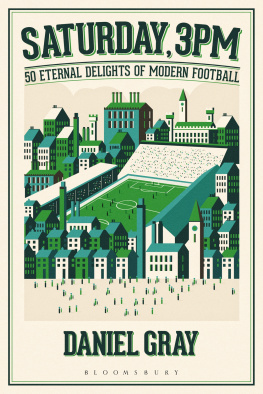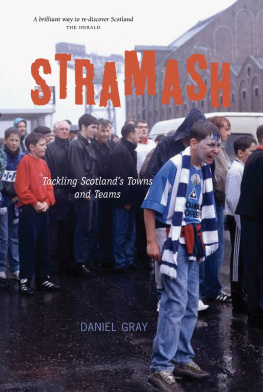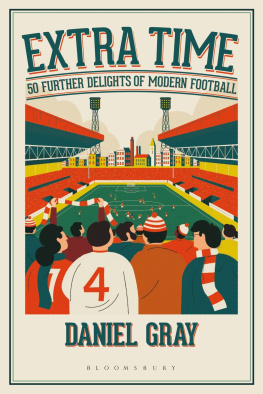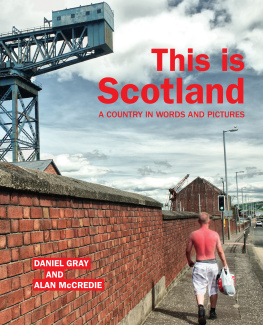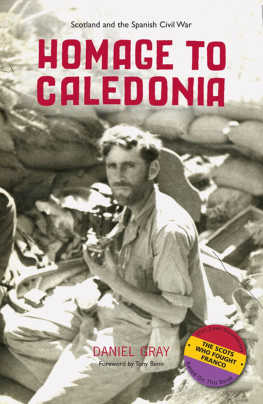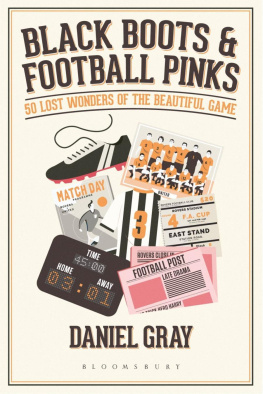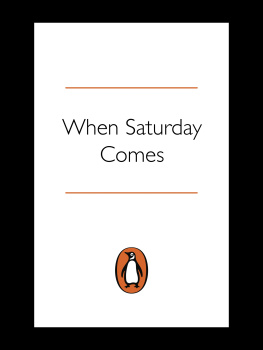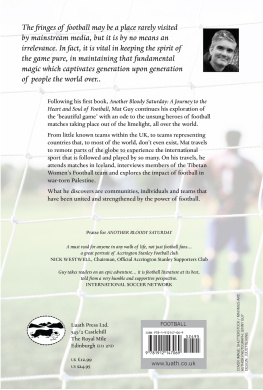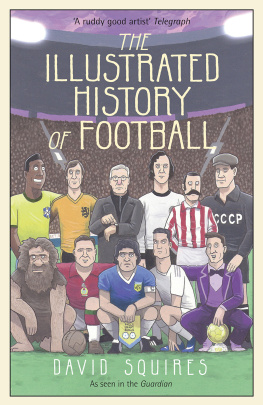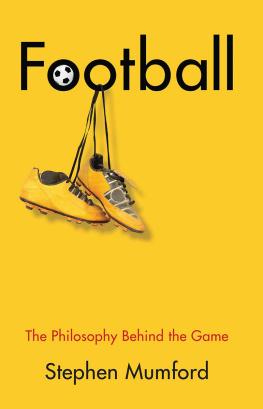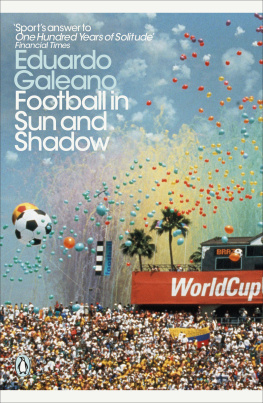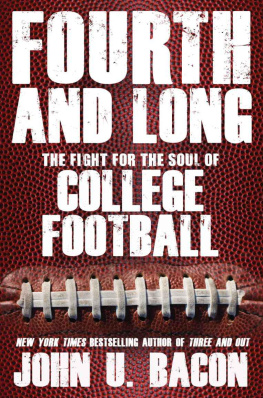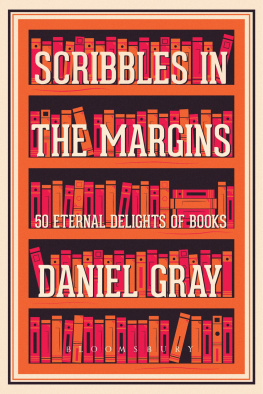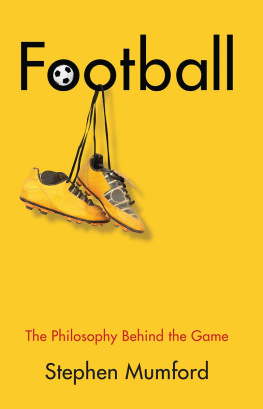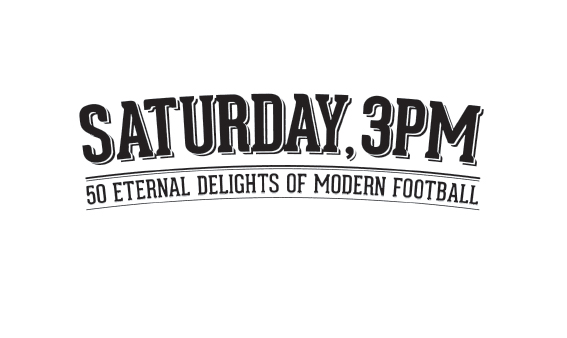
To the girl who listens at the window.

CONTENTS
It would be easy to write a book listing everything that I dislike about modern football. Lunchtime kick-offs, non-black boots, those massive headphones that players wear, sickening wages and absurd ticket prices. I could go on. Goal-line technology, the number of people who sit on dug-out benches, Robbie Savage, after-goal music, false number 9s, and other attempts to sully the chaos and magic of the game with science and theory.
In January 2015, the FA, television and marketing colluded to smear filthy icing on this vulgar cake: they made the FA Cup Third Round last for five days. The FA Cup Third Round. Footballs Christmas. The BBC incessantly referred to the magic of the FA Cup; if they said it enough, we might just believe it. As I tried to comprehend a Third Round tie being on television in the slot usually reserved for DIY SOS , my mind descended into a dark place: did I even like football any more? What, beyond the fact that I am locked in an abusive, one-sided relationship with my team, kept me going along to matches, and still caring?
As with so many great thinkers, the answer came to me in a north-eastern branch of Wetherspoons. At one end of the pub was a games machine with two discarded crutches leaning against it. Perhaps a miracle had occurred during a game of Deal or No Deal. At the other, hundreds of old hardback books lined shelves. It was supposed to give the feeling of a private library in an Edwardian professors villa. If you ignored the couple in the corner necking Apple Sourz, it wasnt far off. There were novels, reference works and text books weighty enough to concuss the sturdiest of County Durham schoolchildren. And there was Delight , by J. B. Priestley. It fitted beautifully into my wifes handbag.
I have read a number of Priestleys novels, and his through a turnstile, into... a more splendid kind of life, from The Good Companions , is my favourite piece of football writing. Possibly any writing, come to think of it. Delight , though, is a non-fiction endeavour in which a self-confessed Grumbler imparts all that is good in the world. Priestley was writing his way out of despondency with grim and grey post-war Britain. In short essays, we share his delight with Shopping in small places, Frightening civil servants, the Sound of a football and 111 other topics.
On the train home to Scotland, my FA Cup sickness still hovering, I began a list, the result of which is this short book. My football delights try hard not to wallow in nostalgia, for that can only lead to regret at what is lost. Nor do they descend into laments for lost terraces, or against modern football posturings. They are about good things that are . In a useful side effect, these passages go some way to explaining our nature, and I hope they are helpful in demonstrating why we are as we are, and justifying season ticket renewals.
Most of all, this book is here to remind you when faced with five days of the Third Round or Football League rebranding why we care.
There is nothing in the carriage which suggests football. Its perhaps a Tuesday morning or a Thursday afternoon. There will be two or three people talking into their phones about missed meetings, or giving Paul from Sales the heads up on something, or booking manicures. Others idle through free newspapers, checking the television listings ahead of another night in. Some jab at their laptop keyboard or a tablet screen. But not me: I have the vague feeling that a flicker of Edgeley Park can be caught, so I am looking out of the window.
The ordinariness of a midweek carriage helps make the spotting of a football ground from a train an act of escapism. In this setting Selhurst Park or London Road or Gayfield it hardly matters are giving me a flirty glance and painting bright a vanilla hour.
I am probably the only one staring from the window, me and my lecherous eye, and the ground is grateful for that. It nods back and takes me momentarily elsewhere: my nostrils can smell fried onions, my ears hear men caterwauling about lottery tickets and programmes.
The most seductive have floodlights, iron pillars like four beckoning fingers. Catch them illuminated from some lonely night train in Coach H and the heart flutters. It is also hollowed by the feeling that life, football, is happening without me.
Sometimes the railway runs so close that I can almost touch the turnstiles. I can see details that Saturday souls, now cooped up in their offices or doing the school run, are missing.
This is a private show; only I know that the nets have been removed, that a lone groundsman is shaking his head in the six-yard box, that the physiotherapists car is in the chairmans parking space.
And then the moment is gone. The train is pulling into the station and it is Tuesday morning again. For the last few minutes, though, I have been somewhere else.
It has to be a large following for the full effect. Away ends in which 143 supporters sit freckled across plastic seats dont work. When their teams score, they resemble the survivors of a shipwreck waving for help. There must be at least a couple of thousand fans for this delight. Best of all if the away end is tight to the pitch and a sell-out.
It is best, too, if the supporters have travelled far. Their day out will have taken planning, and either tight budgeting or a carpe diem moment with credit card to hand. They will have set out early, meaning time to drink and be merry or work themselves into a state of mind where nothing in the world matters so much as a football match. All of this adds to the explosion when their team scores, the goal in itself a justification for time and money.
Who are these away fans? Lads and lasses on the minibus, probably in their twenties or younger, with first jobs and no jobs; the man in the Audi taking a day off from management consultancy, his retired schoolteacher dad in the passenger seat. All the rest, too: old schoolmates and their cousins, exiles who left to find work, teenagers finding something to define themselves by, whole families, and pensioners with five layers on. So many different people, of course united by their team, as we know, but also sharing the raised stakes of travel and away days. It all adds to what happens when the ball goes in.
If you are watching an away end erupt then it is likely that you are in the home seats. You are probably, then, supporting your own team, and your heart is stubbed by the goal. Yet still you can find something impressive about that tremor in the far corner.
For the watcher, it happens gradually. The shot deflects in or the header bangs a post and trips over the line (the goal itself has to come from open play and matter to the scoreline, and the celebratory reaction is noisier and barmier in direct proportion to its speed, surprise and significance.) There is a one-second delay, and you see that corner leap before you hear it howl. The noise it makes is wild, not scriptable. There is the vague shape of a, Yyyyyyyyeah... which collapses into a sustained throaty holler. It lasts until the ball is back on the centre-spot and the PA announcer is ruefully announcing the scorer with the opposite of fanfare. At this point it gives way to a chant; the celebration is the orchestra tuning up, the song their first happy piece.
What makes it so good to watch is the anarchy of movement. Berserk limbs convulse. It is drunken nightclub dancing but on tightly-tiered rows. Hands are not raised for musical notes, but fists are held to the sky in salute of whichever God gave us goals away from home.

